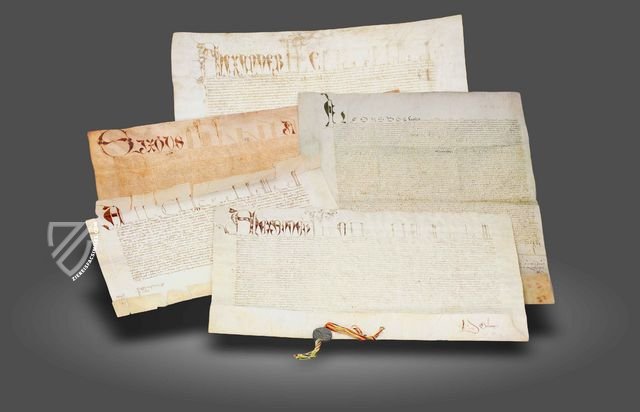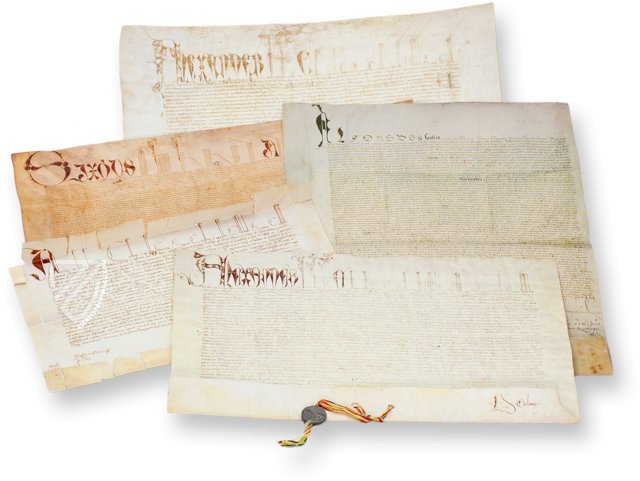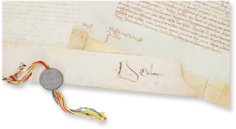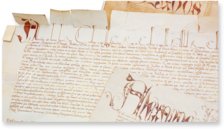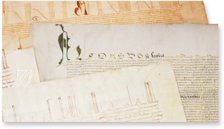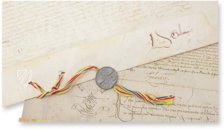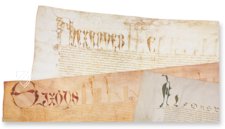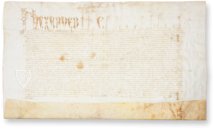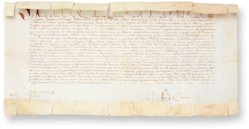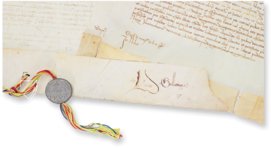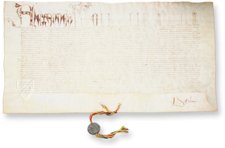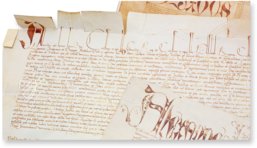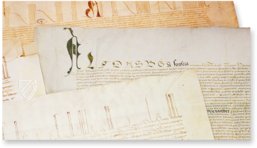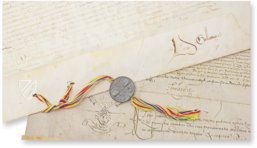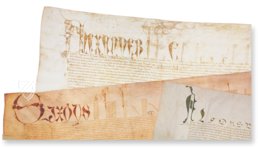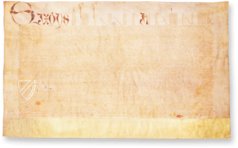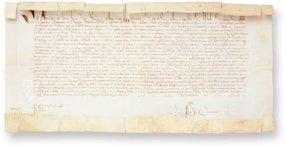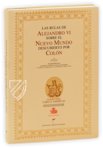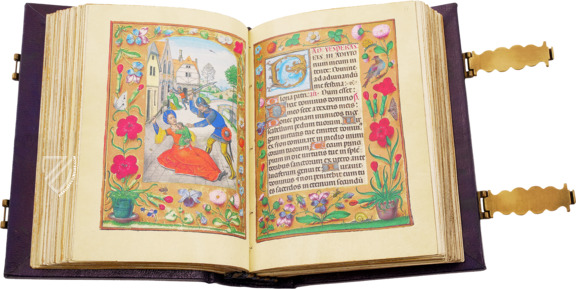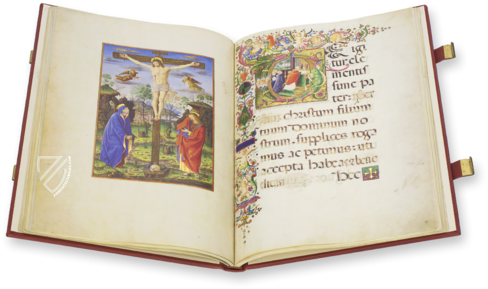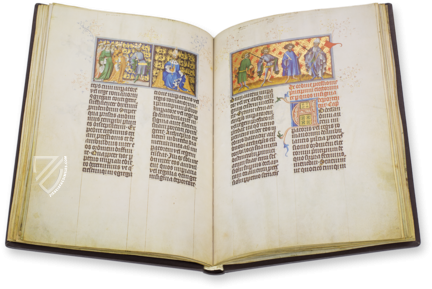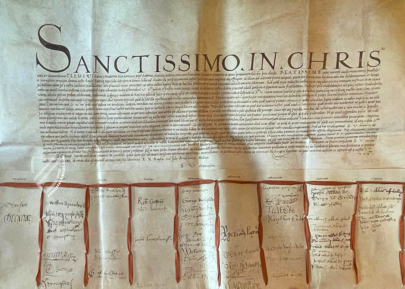Bull of Pope Alexander VI - Partitioning America
(1,000€ - 3,000€)
The historical contract meant to resolve competition between both of the most powerful sea-faring nations of the 15th and 16th centuries: with the bull Inter caetera, Pope Alevander VI regulated the division of the newly discovered regions of the Atlantic Ocean and in America between Spain and Portugal. Spain pushed for a regulation of the division of territory from the highest authority: the Pope. Alexander VI, an influential power politician from the house of Borgia, issued several bulls and regulations as a result in the year 1493. Among these, the Bull Inter caetera occupies a special position, it was nevertheless disputed by the Portuguese King and was eventually revised and amended. This ground-breaking bull thus laid the foundations for the final settlement of territorial claims between the two sea powers in the famous Treaty of Tordesillas dated the 7th of June, 1494.
Bull of Pope Alexander VI - Partitioning America
The historical contract meant to resolve competition between both of the most powerful sea-faring nations of the 15th and 16th centuries: with the bull Inter caetera, Pope Alexander VI regulated the division of the newly discovered regions of the Atlantic Ocean and in America between Spain and Portugal. Spain pushed for a regulation of the division of territory from the highest authority: the Pope. Alexander VI, an influential power politician from the house of Borgia, issued several bulls and regulations as a result in the year 1493. Among these, the Bull Inter caetera occupies a special position, it was nevertheless disputed by the Portuguese King and was eventually revised and amended. This ground-breaking bull thus laid the foundations for the final settlement of territorial claims between the two sea powers in the famous Treaty of Tordesillas dated the 7th of June, 1494.
Kings in Competition
The discoveries of Columbus during his first voyage across the Atlantic aroused new aspirations in both Spain as well as Portugal. This quickly produced claims of ownership over the newly discovered regions of America. The Portuguese King John II declared the regions that were discovered by Columbus to be Portuguese property. This could not be tolerated by the Spanish Kings and they pushed for an official settlement of these territorial claims from the highest authority: the pope.
A Pope as Diplomat
Pope Alexander VI (1492–1503) came from the influential and powerful Borgia family. He himself is known as a relentless power politician and true prince of the church during the Renaissance. He intervened in the disputes between the Spanish and Portuguese sea powers – at the express request of the Spanish – in the year 1493. In the Bull Inter caetera, it stipulates that: “[…] we hereby bestow, grant, and transmit […] to you and your heirs and successors, the Kings of Castile and León, for all times, in the case that one of the islands mentioned were to be found by your dispatched men and captains, all found or to be found, all discovered or to be discovered, islands and continents together with all dominions, cities, stores, places, villages, and all the rights thereto.”
The Disputed Line of Demarcation
The Bull inter caetera from May of 1493 regulated the division of the newly discovered regions under the competing Spanish and Portuguese sea powers. The main body of the text is concerned with the determination of a line of demarcation approximately around 38° West, some 480 kilometers west of the Cape Verde Islands in a north-south direction going from pole to pole through the Atlantic Ocean. The regions to the west would belong to Spain, those to the East to Portugal. Having said this, Portugal was not in agreement, and they still pushed for an appropriation of the coast of Brazil. Thus it came to negotiations and a subsequent shift of the line of demarcation to the west, so that Brazil still belonged to Portugal east of the line.
A “Gift” of the Pope – with Conditions
The bull Inter caetera was revised with the regulations of the Aeterni regis from the year 1481 and was soon appended through the subsequent bull Dudum siquidem dated September 26, 1493. This last document summarized the numerous papal bulls of 1493 and their continuously modified rules. This finally lead to the negotiations for the famous Treaty of Tordesilla from June 7, 1494. The pope consequently gave the Spanish kings the right to the newly discovered lands and regions of America. Simultaneously, he also set conditions for the Spanish conquerors: the New World should be missionized by the Spaniards. With its unique historical records and regulations, the Bull Inter caetera offers a glimpse into this exciting chapter of world history, the discovery and partition of the New World!
Codicology
- Alternative Titles
- Bulas de Alejandro VI
Bulle Alexanders VI. Borgia
Papal Bulls that Partitioned the New World
Documents Concerning the Non-Catholic World (Collection) - Size / Format
- 7 documents / 68.0 × 48.0 cm
- Origin
- Italy
- Date
- 1481–1493
- Epochs
- Style
- Language
- Script
- Secretary
- Content
- Papals bulls concerning the settlement of the New World from Sixtus IV and Alexander VI
- Patron
- Pope Alexander VI (1431-1503)
#1 Bulas de Alejandro VI
Language: Spanish
(1,000€ - 3,000€)
- Treatises / Secular Books
- Apocalypses / Beatus
- Astronomy / Astrology
- Bestiaries
- Bibles / Gospels
- Chronicles / History / Law
- Geography / Maps
- Saints' Lives
- Islam / Oriental
- Judaism / Hebrew
- Single Leaf Collections
- Leonardo da Vinci
- Literature / Poetry
- Liturgical Manuscripts
- Medicine / Botany / Alchemy
- Music
- Mythology / Prophecies
- Psalters
- Other Religious Books
- Games / Hunting
- Private Devotion Books
- Other Genres
- Afghanistan
- Armenia
- Austria
- Belgium
- Belize
- Bosnia and Herzegovina
- China
- Colombia
- Costa Rica
- Croatia
- Cyprus
- Czech Republic
- Denmark
- Egypt
- El Salvador
- Ethiopia
- France
- Germany
- Greece
- Guatemala
- Honduras
- Hungary
- India
- Iran
- Iraq
- Israel
- Italy
- Japan
- Jordan
- Kazakhstan
- Kyrgyzstan
- Lebanon
- Liechtenstein
- Luxembourg
- Mexico
- Morocco
- Netherlands
- Palestine
- Panama
- Peru
- Poland
- Portugal
- Romania
- Russia
- Serbia
- Spain
- Sri Lanka
- Sweden
- Switzerland
- Syria
- Tajikistan
- Turkey
- Turkmenistan
- Ukraine
- United Kingdom
- United States
- Uzbekistan
- Vatican City
- A. Oosthoek, van Holkema & Warendorf
- Aboca Museum
- Ajuntament de Valencia
- Akademie Verlag
- Akademische Druck- u. Verlagsanstalt (ADEVA)
- Aldo Ausilio Editore - Bottega d’Erasmo
- Alecto Historical Editions
- Alkuin Verlag
- Almqvist & Wiksell
- Amilcare Pizzi
- Andreas & Andreas Verlagsbuchhandlung
- Archa 90
- Archiv Verlag
- Archivi Edizioni
- Arnold Verlag
- ARS
- Ars Magna
- Art Market
- ArtCodex
- AyN Ediciones
- Azimuth Editions
- Badenia Verlag
- Bärenreiter-Verlag
- Belser Verlag
- Belser Verlag / WK Wertkontor
- Benziger Verlag
- Bernardinum Wydawnictwo
- BiblioGemma
- Biblioteca Apostolica Vaticana (Vaticanstadt, Vaticanstadt)
- Bibliotheca Palatina Faksimile Verlag
- Bibliotheca Rara
- Boydell & Brewer
- Bramante Edizioni
- Bredius Genootschap
- Brepols Publishers
- British Library
- C. Weckesser
- Caixa Catalunya
- Canesi
- CAPSA, Ars Scriptoria
- Caratzas Brothers, Publishers
- Carus Verlag
- Casamassima Libri
- Centrum Cartographie Verlag GmbH
- Chavane Verlag
- Christian Brandstätter Verlag
- Circulo Cientifico
- Club Bibliófilo Versol
- Club du Livre
- CM Editores
- Collegium Graphicum
- Collezione Apocrifa Da Vinci
- Comissão Nacional para as Comemorações dos Descobrimentos Portugueses
- Coron Verlag
- Corvina
- CTHS
- D. S. Brewer
- Damon
- De Agostini/UTET
- De Nederlandsche Boekhandel
- De Schutter
- Deuschle & Stemmle
- Deutscher Verlag für Kunstwissenschaft
- DIAMM
- Dropmore Press
- Droz
- E. Schreiber Graphische Kunstanstalten
- Ediciones Boreal
- Ediciones Grial
- Ediclube
- Edições Inapa
- Edilan
- Editalia
- Edition Deuschle
- Edition Georg Popp
- Edition Leipzig
- Edition Libri Illustri
- Editiones Reales Sitios S. L.
- Éditions de l'Oiseau Lyre
- Editions Medicina Rara
- Editorial Casariego
- Editorial Mintzoa
- Editrice Antenore
- Editrice Velar
- Edizioni Edison
- Egeria, S.L.
- Eikon Editores
- Electa
- Emery Walker Limited
- Enciclopèdia Catalana
- Eos-Verlag
- Ephesus Publishing
- Ernst Battenberg
- Eugrammia Press
- Extraordinary Editions
- Fackelverlag
- Facsimila Art & Edition
- Facsimile Editions Ltd.
- Facsimilia Art & Edition Ebert KG
- Faksimile Verlag
- Feuermann Verlag
- Folger Shakespeare Library
- Franco Cosimo Panini Editore
- Friedrich Wittig Verlag
- Fundación Hullera Vasco-Leonesa
- G. Braziller
- Gabriele Mazzotta Editore
- Gebr. Mann Verlag
- Gesellschaft für graphische Industrie
- Getty Research Institute
- Giovanni Domenico de Rossi
- Giunti Editore
- Graffiti
- Grafica European Center of Fine Arts
- Guido Pressler
- Guillermo Blazquez
- Gustav Kiepenheuer
- H. N. Abrams
- Harrassowitz
- Harvard University Press
- Helikon
- Hendrickson Publishers
- Henning Oppermann
- Herder Verlag
- Hes & De Graaf Publishers
- Hoepli
- Holbein-Verlag
- Houghton Library
- Hugo Schmidt Verlag
- Idion Verlag
- Il Bulino, edizioni d'arte
- ILte
- Imago
- Insel Verlag
- Insel-Verlag Anton Kippenberger
- Instituto de Estudios Altoaragoneses
- Instituto Nacional de Antropología e Historia
- Introligatornia Budnik Jerzy
- Istituto dell'Enciclopedia Italiana - Treccani
- Istituto Ellenico di Studi Bizantini e Postbizantini
- Istituto Geografico De Agostini
- Istituto Poligrafico e Zecca dello Stato
- Italarte Art Establishments
- Jan Thorbecke Verlag
- Johnson Reprint Corporation
- Johnson Reprint Corporation
- Josef Stocker
- Josef Stocker-Schmid
- Jugoslavija
- Karl W. Hiersemann
- Kasper Straube
- Kaydeda Ediciones
- Kindler Verlag / Coron Verlag
- Kodansha International Ltd.
- Konrad Kölbl Verlag
- Kurt Wolff Verlag
- La Liberia dello Stato
- La Linea Editrice
- La Meta Editore
- Lambert Schneider
- Landeskreditbank Baden-Württemberg
- Leo S. Olschki
- Les Incunables
- Liber Artis
- Library of Congress
- Libreria Musicale Italiana
- Lichtdruck
- Lito Immagine Editore
- Lumen Artis
- Lund Humphries
- M. Moleiro Editor
- Maison des Sciences de l'homme et de la société de Poitiers
- Manuscriptum
- Martinus Nijhoff
- Maruzen-Yushodo Co. Ltd.
- MASA
- Massada Publishers
- McGraw-Hill
- Metropolitan Museum of Art
- Militos
- Millennium Liber
- Müller & Schindler
- Nahar - Stavit
- Nahar and Steimatzky
- National Library of Wales
- Neri Pozza
- Nova Charta
- Oceanum Verlag
- Odeon
- Omnia Arte
- Orbis Mediaevalis
- Orbis Pictus
- Österreichische Staatsdruckerei
- Oxford University Press
- Pageant Books
- Parzellers Buchverlag
- Patrimonio Ediciones
- Pattloch Verlag
- PIAF
- Pieper Verlag
- Plon-Nourrit et cie
- Poligrafiche Bolis
- Presses Universitaires de Strasbourg
- Prestel Verlag
- Princeton University Press
- Prisma Verlag
- Priuli & Verlucca, editori
- Pro Sport Verlag
- Propyläen Verlag
- Pytheas Books
- Quaternio Verlag Luzern
- Reales Sitios
- Recht-Verlag
- Reichert Verlag
- Reichsdruckerei
- Reprint Verlag
- Riehn & Reusch
- Roberto Vattori Editore
- Rosenkilde and Bagger
- Roxburghe Club
- Salerno Editrice
- Saltellus Press
- Sandoz
- Sarajevo Svjetlost
- Schöck ArtPrint Kft.
- Schulsinger Brothers
- Scolar Press
- Scrinium
- Scripta Maneant
- Scriptorium
- Shazar
- Siloé, arte y bibliofilia
- SISMEL - Edizioni del Galluzzo
- Sociedad Mexicana de Antropología
- Société des Bibliophiles & Iconophiles de Belgique
- Soncin Publishing
- Sorli Ediciones
- Stainer and Bell
- Studer
- Styria Verlag
- Sumptibus Pragopress
- Szegedi Tudomànyegyetem
- Taberna Libraria
- Tarshish Books
- Taschen
- Tempus Libri
- Testimonio Compañía Editorial
- TGB Limited Editions
- Thames and Hudson
- The Clear Vue Publishing Partnership Limited
- The Facsimile Codex
- The Folio Society
- The Marquess of Normanby
- The Richard III and Yorkist History Trust
- Tip.Le.Co
- TouchArt
- TREC Publishing House
- TRI Publishing Co.
- Trident Editore
- Tuliba Collection
- Typis Regiae Officinae Polygraphicae
- Union Verlag Berlin
- Universidad de Granada
- Universitaire Bibliotheken Leiden
- University of California Press
- University of Chicago Press
- Urs Graf
- Vallecchi
- Van Wijnen
- VCH, Acta Humaniora
- VDI Verlag
- VEB Deutscher Verlag für Musik
- Verlag Anton Pustet / Andreas Verlag
- Verlag Bibliophile Drucke Josef Stocker
- Verlag der Münchner Drucke
- Verlag für Regionalgeschichte
- Verlag Styria
- Vicent Garcia Editores
- W. Turnowski Ltd.
- W. Turnowsky
- Waanders Printers
- Wiener Mechitharisten-Congregation (Wien, Österreich)
- Wissenschaftliche Buchgesellschaft
- Wissenschaftliche Verlagsgesellschaft
- Wydawnictwo Dolnoslaskie
- Xuntanza Editorial
- Zakład Narodowy
- Zollikofer AG

